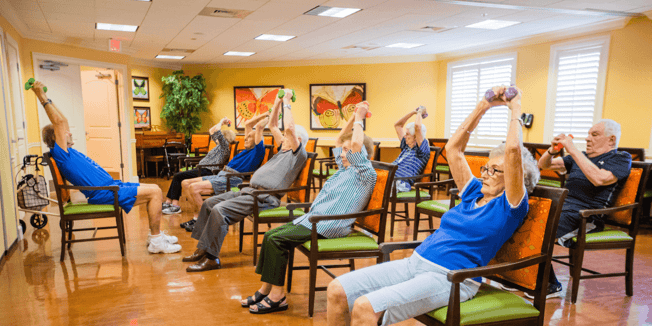Find senior-friendly Assisted Living facilities for seniors who love animals.
Find senior-friendly Assisted Living facilities for seniors who love animals.
Blog Article
The Role of Assisted Residing In Offering Specialized Take Care Of Mental Deterioration Clients
The provision of specialized take care of mental deterioration individuals within assisted living facilities is significantly acknowledged as an important element of efficient dementia administration. These environments are made to address the distinct cognitive and emotional challenges dealt with by individuals with mental deterioration, supplying tailored support that promotes safety and health. By integrating structured routines and appealing tasks, helped living can reduce feelings of seclusion while improving overall quality of life. The efficiency of these programs frequently hinges on various aspects, consisting of personnel training and family members participation, prompting a closer assessment of just how these elements interact to maximize care outcomes.
Understanding Mental Deterioration Care Needs
Understanding the care needs of individuals with dementia is essential for giving reliable support and enhancing their quality of life. Dementia is a modern neurological condition that influences cognitive features such as memory, reasoning, and communication. Subsequently, individuals with mental deterioration usually call for help with day-to-day activities, individualized treatment strategies, and emotional support.
Efficient dementia care entails acknowledging the distinct difficulties faced by each person. This consists of recognizing the phases of mental deterioration, which can range from light cognitive impairment to advanced stages calling for detailed assistance. Care needs may encompass assistance in managing day-to-day routines, drug adherence, and preserving social communications to avoid seclusion.
In addition, sensory stimulation and familiar atmospheres can substantially enhance the wellness of individuals with mental deterioration. Caretakers must be trained to determine behavioral adjustments and use approaches tailored per individual's choices and past experiences. Methods such as recognition therapy and memory can help connect efficiently and foster a complacency.
Eventually, efficiently resolving the care demands of people with dementia calls for a compassionate approach, recurring training for caregivers, and a commitment to keeping dignity and regard throughout the caregiving process.
Benefits of Assisted Living

Assisted living promotes social communication amongst homeowners, fostering a sense of area and belonging. Engaging with peers can relieve sensations of seclusion, which are usual in those living with mental deterioration.
On top of that, many assisted living facilities use help with daily tasks, such as medication administration, showering, and dish prep work. This support allows homeowners to maintain their self-reliance while ensuring their health and well-being are focused on. Ultimately, assisted living acts as a beneficial source, stabilizing care and freedom for individuals with dementia and their households.

Specialized Programs and Activities
(Charlotte Alzheimer's Care)Acknowledging the special needs of people with dementia, lots of assisted living centers apply specialized programs and activities designed to improve cognitive function and promote total well-being. These programs typically include cognitive excitement activities that engage residents in memory games, problems, and memory therapy, which motivates the sharing of individual stories and past experiences.
In addition, art and music treatment play significant functions in fostering creative thinking and emotional expression (Memory Care). Engaging citizens in painting, crafting, or songs sessions can give healing advantages, assisting to lower anxiety and enhance mood. Physical activities, such as mild exercises and dance sessions, are also vital, as they promote movement and physical wellness while motivating social communication among homeowners
Organized everyday routines are usually developed to provide a feeling of security and predictability for individuals with mental deterioration. These routines can consist of scheduled meal times, group tasks, and individualized treatment plans that accommodate individual rate of interests and capacities. By developing an enhancing atmosphere filled with customized tasks, aided living facilities not just enhance the lifestyle for site link dementia individuals but also foster a sense of community and belonging.
Educated Staff and Assistance
(Dementia Care Charlotte)In helped living facilities, the visibility of qualified personnel is essential for offering effective support to people with mental deterioration. These experts have specialized understanding and abilities to deal with the distinct needs of homeowners, guaranteeing their safety and security, convenience, and health. Personnel get training in dementia treatment, which includes understanding the development of the condition, recognizing behavior adjustments, and employing reliable interaction methods.
Additionally, qualified personnel are outfitted to apply individualized care strategies tailored per citizen's preferences and capabilities. This personalized method cultivates a feeling of autonomy and dignity, permitting citizens to participate in meaningful activities that enhance their high quality of life. The team likewise play an essential duty in keeping an eye on health and wellness and health, quickly recognizing any type of changes in problem that might need medical focus.
In addition to guide care, qualified team supply emotional support to homeowners, aiding to ease feelings of complication and anxiety that often accompany dementia. Their compassionate approach produces a caring setting where locals really feel valued and recognized - Assisted Living. Ultimately, the experience and devotion of experienced staff are essential in delivering extensive treatment that satisfies the intricate demands of people coping with mental deterioration in assisted living settings
Family Participation and Resources
Family members involvement plays a substantial duty in the treatment of individuals with dementia in nursing home. Involving family members in the treatment procedure not just boosts the emotional wellness of the citizen however additionally fosters a collaborative atmosphere where treatment plans can be tailored to individual requirements. Households can supply valuable insights into the preferences, background, and habits of their liked ones, which can notify caretakers and lead to more customized treatment approaches.
Moreover, aided living centers often supply resources for family members, such as assistance groups and educational workshops. These sources can assist households understand mental deterioration, enhance interaction approaches, and establish coping mechanisms. Participation in these programs can encourage household members, outfitting them with the tools essential to sustain their loved ones successfully.
Furthermore, routine communication in between families and staff is vital. This continuous dialogue allows family members to remain informed about their enjoyed one's progress and any type of modifications in treatment plans. Ultimately, a strong collaboration in between family members and aided living facilities cultivates an atmosphere of trust fund and understanding, guaranteeing that people with dementia receive the specialized treatment they are worthy of while maintaining their family members links.
Final Thought
Finally, aided living centers play an essential duty in resolving the one-of-a-kind needs of mental deterioration patients via personalized treatment and assistance. By promoting safe environments, advertising social communication, and executing structured regimens, these facilities improve the overall well-being of homeowners. The participation of skilled staff and families better improves the care experience, making sure that individual choices and backgrounds are respected. Inevitably, assisted living offers important sources that substantially boost the lifestyle for those coping with dementia.
Report this page